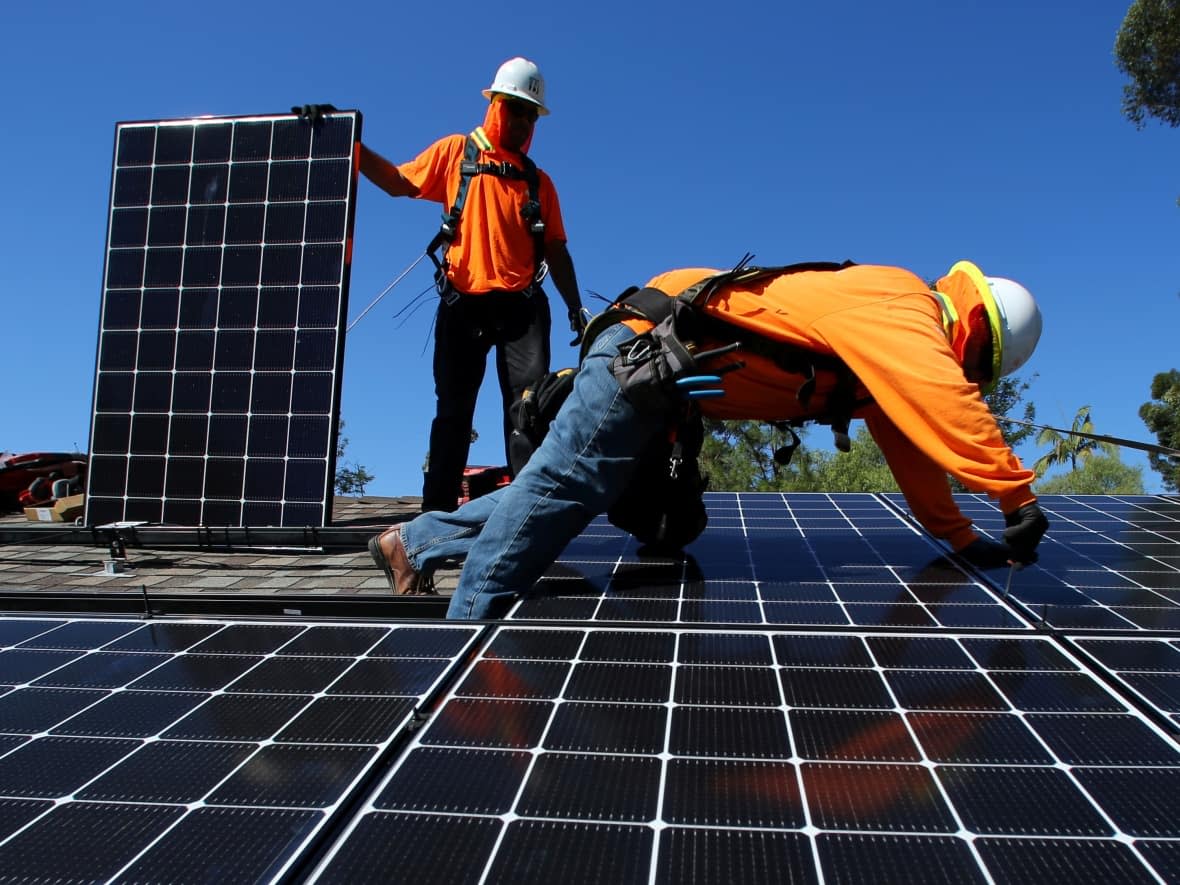Solar industry says proposed Nova Scotia Power charge will devastate sector

Homeowners, politicians and those in the solar industry are blasting Nova Scotia Power's proposed new charge for people who generate their own electricity and sell it back to the grid.
The company applied to the Nova Scotia Utility and Review Board on Thursday for various changes, including increasing electricity rates for residential customers by at least 10 per cent over the next three years.
The application includes a "system access charge" of $8 per kilowatt monthly on net metered installations. The vast majority of the province's 4,100 net metering customers are residential customers with solar power, according to the application.
"My heart just sank. You know, all of our plans have been, I would say, almost completely destroyed over that," Trevor Brown told CBC Radio's Maritime Noon on Friday.
Brown and his wife are planning to build a home on Grand Lake on the outskirts of Halifax, and they have already signed a contract to install solar panels.
"The plan is to have a greener home and to have less of an impact on the environment. It's crazy, it's crazy what they're trying to do," Brown said.
Solar panel sector will be 'destroyed,' says homeowner
For those with a typical 10-kilowatt solar system, which generates around $1,800 of electricity a year, the new charge would mean those customers would be required to pay $960 back to NSP.
Net metering customers who enrolled before Feb. 1, 2022, would be exempt from the charge for 25 years after they sign up.
Brown said their system is about 14 kilowatts. If the charge is approved, Brown said it would likely take his family 18 years, instead of nine, to pay off their solar investment.
"It'll discourage people from going into solar, and moreover, to that point, it's going to destroy the solar panel installer industry," Brown said.
He had a call with his solar installer Friday, who Brown said has been left reeling from the announcement and getting lots of calls from customers.
David Brushett of Solar Nova Scotia is also hearing similar stories.

The non-profit society advocates for 100 per cent sustainable renewable energy in the province. Brushett told Maritime Noon on Friday that he was "shocked and disappointed" by the proposed charge, which he said was excessive and unreasonable.
There are 40 corporate members in Solar Nova Scotia, Brushett said, most of which are small installation businesses employing hundreds of people in the growing sector.
"They're likely going to have to lay people off. They're getting cancellations for installations, so it's really devastating for the whole industry," Brushett said.
"It's having immediate consequences."
Solar group says demand for panels will plunge
With the expected payback period on solar investments stretching to around 30 years under the proposed changes, rather than the average 10-year span, Brushett anticipates a "giant decrease" in demand for solar panels as most homeowners will no longer find the upgrades affordable.
Brushett said the utility should have engaged first with stakeholders. His group intends to appear as an intervener before the board, and in the coming days, it plans to organize an official response and rally its corporate members to fight the proposed charge.
NSP's application said net metering customers are benefiting from the overall system, but not contributing to its cost, which amounts to a subsidy.
Dave Landrigan, vice-president of commercial with NSP, told reporters Friday that the current system essentially has non-solar customers subsidizing the costs needed to support net metering customers.
Change needed to correct inequity: NSP
This happens because the Nova Scotia electrical system is designed to serve peak electricity loads, which happen during the evenings on winter months, Landrigan said.
Because the sun isn't shining during those winter evenings, NSP has to build, or contract out, enough generating power to serve those net meter customers as well, he said — a cost which falls to non-solar customers.
If the current net metering system continues as it is, Landrigan said everyone else would pay about $55 million between now and 2030. That number assumes about 2,000 people sign up for net metering each year over the next nine years.
"We are looking to correct this inequity as our obligation is to ensure fair and equitable rates for all our customers," Landrigan said.
Both the provincial Liberals and NDP expressed concerns about the application and called for Premier Tim Houston's government to step in.
Politicians, advocates say charge too high
The province's Minister of Natural Resources and Renewables Tory Rushton said Friday he was "disappointed" to see this proposal by Nova Scotia Power.
"Let's make something very clear — this government will protect ratepayers. We're going to be active intervenors in this process. And we are exploring all of our options to respond to this move," Rushton said in a statement.
He added that the province has set ambitious targets for reducing greenhouse gas emissions, and a range of solutions are needed to reach those goals, including solar.
"We're frustrated that NS Power has made a proposal that can hinder the progress we've been making to advance our climate change goals," Rushton said.
Liberal Leader Iain Rankin said in a release that NSP's request is "punishing" those investing in renewable energy just a day after the utility announced an extension of the Trenton coal power plant, "placing Nova Scotia's climate targets into jeopardy."
Claudia Chender, the NDP critic for natural resources and renewables, said the proposed changes to the solar program will "threaten the viability of the green energy sector's future in Nova Scotia."
In a news release Friday, Sierra Club Canada accused NSP of putting profit before the needs of Nova Scotians.
"The company is gaslighting homeowners who want to be part of the climate solution," said national programs director Gretchen Fitzgerald.
"It's giving the public the false impression that homeowners with solar panels are cashing in on low electricity at the expense of other customers. That's simply not true. It takes most solar customers at least 10 years just to pay off the loans for their solar panel installation."
The group said the NSP monopoly should be broken, and announced a Power to the People campaign, calling on Nova Scotians to demand "energy democracy" that allows municipalities, homeowners and businesses to participate in a rapid transition to clean renewable energy without being penalized.
Landrigan said NSP understands their application "has caused concern," but there will be a detailed process before the UARB and all interested parties, including the solar industry, will be able to participate.
When asked if the province had yet reached out to NSP directly to reconsider this charge, Landrigan said they expect to have conversations but "it's our practice not to discuss any of those."
MORE TOP STORIES

 Yahoo Movies
Yahoo Movies 
